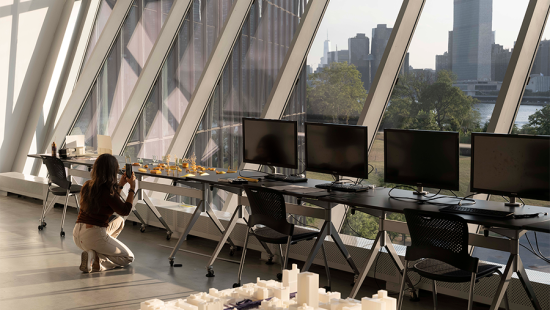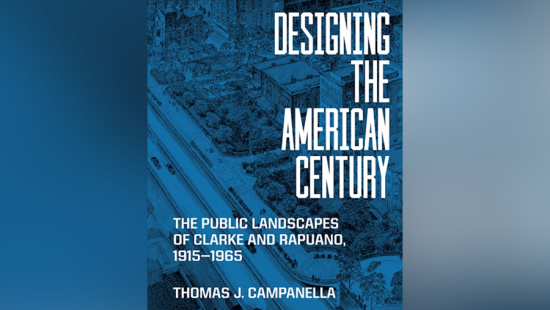Capturing the Missing Pieces: Connection and Understanding Through Research
With research interests crossing international development and planning, capital-labor relations, and South-South migration, CRP Assistant Professor Ding Fei brings to light the on-the-ground experiences and challenges faced by those working outside the spotlight of media headlines.
As you might expect from a researcher, Ding Fei is frustrated by polarizing media headlines that obscure the complex challenges present in Chinese development work in Africa, a topic she has explored extensively. Fei, who joined the Department of City and Regional Planning at AAP in 2023 as an assistant professor, says that "politically charged narratives often miss the nuances of different layers of actors involved and the diversity of the day-to-day interactions." Through her work, she has come to especially value the power of understanding the interplay of all the various actors and how those dynamics ripple out across communities. It's a perspective that shapes her own research, as well as the conversations and projects she explores with students in the classroom.
Molly Sheridan: To begin with, could you tell me about your research areas of focus and what motivated you to zero in on these topics?
Ding Fei: I'm broadly interested in international development planning, infrastructure-led urbanization and industrialization, as well as issues of labor and migration in the context of South-South cooperation. My empirical research focuses on Chinese activities in Africa, particularly in Ethiopia, where I've studied different types of Chinese activity. I'm interested in understanding how these activities influence community engagement, labor skills development, and the transfer of knowledge in the context of Afro-Asian linkages.
I'm interested in this topic primarily because I'm puzzled by the polarized media headlines about what China is doing in Africa. There was a period of time when South-South cooperation was broadly celebrated as something that brought mutual respect and reciprocity to development cooperation; it represented an alternative to the North-South relationship, which was often marked by the one-way transfer of knowledge and policies. But in reality, there are power dynamics and uneven capabilities within the so-called Global South.
I think the media headlines often capture either the celebratory aspects of China-Africa relationships — Chinese loans filling the gap of infrastructure financing in Africa or depicting China as a neocolonial power exploiting African workers and resources. These politically charged narratives often miss the nuances of different layers of actors involved and the diversity of the day-to-day interactions. My work aims to go beyond those headlines to unpack the dynamics of these relationships and examine the real impact on people and communities on the ground.
"Many of these workers come from the middle and lower strata of Chinese society and seek overseas jobs to support their families back home. These private actors and labor groups are often missing from the conversation."
MS: Would you speak a little bit more about what you're actually finding that is different from what we're reading in the headlines? Or just generally, what you wish more people knew about the issues you study?
DF: A common narrative in the headlines is that all Chinese activities are directed by the Chinese state. But in reality, there's much disparity within the so-called Chinese state — between central and local governments, between different ministries, and between governments and state-owned enterprises. We often see misalignments between what's said and what's actually done. Beyond state actors, there are also private actors — some with varying degrees of affiliation to the state — and a significant number of Chinese workers. Many of these workers come from the middle and lower strata of Chinese society and seek overseas jobs to support their families back home. These private actors and labor groups are often missing from the conversation.
Another gap in the literature is the lack of recognition of Africa as an active participant in this process, not a passive recipient of Chinese capital and labor. African politicians, businesses, communities, and labor unions are actively engaging, negotiating, and shaping the outcomes of these interactions. My research focuses on these encounters to understand the capabilities and constraints of African agency.
MS: How does your research then impact the work you're doing in the classroom? Is there any conversation happening there?
DF: I bring my research and field experiences into classes I teach. For example, in my master's class on research design and qualitative methods, each student designs an independent research project. They collect and analyze their own data. I share my own struggles of designing research projects that are both conceptually grounded and empirically feasible. I share my experiences of going into the field and engaging with people from very different backgrounds. I talk with students about how to handle their emotions, how to deal with rejections, and how to build trust to create a space for respectful conversations with people they meet.
In my class on international institutions, we explore institutions both as formal organizations with clear rules and regulations and as negotiated space with fluid boundaries and implicit norms. We discuss how different institutions function, evolve and interact to shape urban governance and development. This perspective is something I’ve developed through working with diverse organizations and social groups in both China and Ethiopia.
In my teaching, I strive to emphasize the importance of breaking out of compartmentalized thinking in our training. If you're studying housing, it's never just about housing. It's intertwined with history, politics, social norms, and cultural practices. Building connections and linkages across fields is important to fully understand the complexities of the issues we study.
MS: Coming at the question a little bit differently, in addition to what you've just said, are there any other big questions or ideas or things that you find it very important to work on with your students in the classroom?
DF: For all of my classes, in the very first lecture at the beginning of the semester, we'll have a discussion of what's happening in the field. For example, we'll talk about what are the urban challenges in cities in the Global South. So that's a time when we talk about a lot of problems, issues, challenges — which can sometimes feel frustrating and depressing. And the very last lecture, we'll talk about futures. It's a space for us to collectively imagine a better future and how to get there. The message I want to convey to my students is that we see all the problems, and we need to work together, build solidarity, build community, and to think innovatively and strategically about how to make things better.
"The students work on vastly different topics and, by working with them, I see many great ideas and a strong passion for making meaningful change. This kind of action-oriented spirit is something I really appreciate; it gives me a lot of courage and excitement for teaching and research."
MS: I'm curious what the students are feeding back to you. What's notable when you look at the work they produce and the perspectives they share in these discussions?
DF: This semester, I have an amazing group of students in my qualitative research class, not just from CRP but also from other colleges. The students work on vastly different topics and, by working with them, I see many great ideas and a strong passion for making meaningful change. This kind of action-oriented spirit is something I really appreciate; it gives me a lot of courage and excitement for teaching and research.
For my other classes, I design assignments to be flexible so students can explore topics they're interested in. This allows me to learn a lot as well. Some students had internships at UN agencies, and they shared their experiences. Some worked in different geographic areas and brought their encounters and reflections to class discussions. These perspectives enrich my own understanding of the field. The extra credit assignment for my course is for students to suggest a teaching resource to me. It could be a media piece, a documentary, or anything that helped them understand a certain topic. Learning from my students helps me become a better teacher and prepares me for future courses.
MS: I'm curious if you might share an example of a transformative or remarkable moment that you experienced as a student, something that maybe pushed you toward what you're studying now or just something that you hold with you as you teach.
DF: When I was doing my master's thesis research in Xinjiang in Western China, I studied the settlement process of ethnic pastoral communities. This was a project initiated by the central government and implemented by assigned provincial officials, as well as by internal migrants from other provinces. During my fieldwork, I worked with both these external officials and workers and the local communities, and I noticed the mismatch between the central planning and the local reactions to and experiences of the settlement programs. After completing my research, I shared my findings with the top officials overseeing the local program. Their reaction was clear — they wouldn’t welcome me to do research on this topic further. I was in my early 20s at the time, and that moment stayed with me. It made me think deeply about how to communicate critical findings strategically, and how to build rather than burn the bridge in such contexts to make sure our research has a meaningful and constructive impact. This is something I often discuss with my students. I believe how to communicate findings to different audiences and in different cultural and institutional contexts is an important skill we should teach our students.
MS: You recently published two great papers exploring aspects of Chinese labor in Africa. I'm curious about where you expect your research to take you next.
DF: Both papers were COVID projects, developed during the time when I couldn't travel far for fieldwork. In the first paper, I look into lawsuits filed by Chinese workers returning from Africa. I developed the conceptual frameworks of flexible sovereignty and contested legality to unpack the complex process of coupling and decoupling between Chinese capital and labor in overseas ventures. The second paper explores the impacts of COVID on Chinese migrants. I found that Africa has become something different in the imagination of Chinese migrants. They used to see Africa as a transient space to work for a project or two, earn money, and return home. But because of COVID and its economic and political repercussions, I see more and more migrants projecting their long-term careers and livelihoods in Africa. This shift has encouraged many migrants to move away from short-term, profit-driven practices towards long-term business sustainability. My next project will further explore how this shift in life and career planning shapes the way they build communities and create spaces in African cities.








